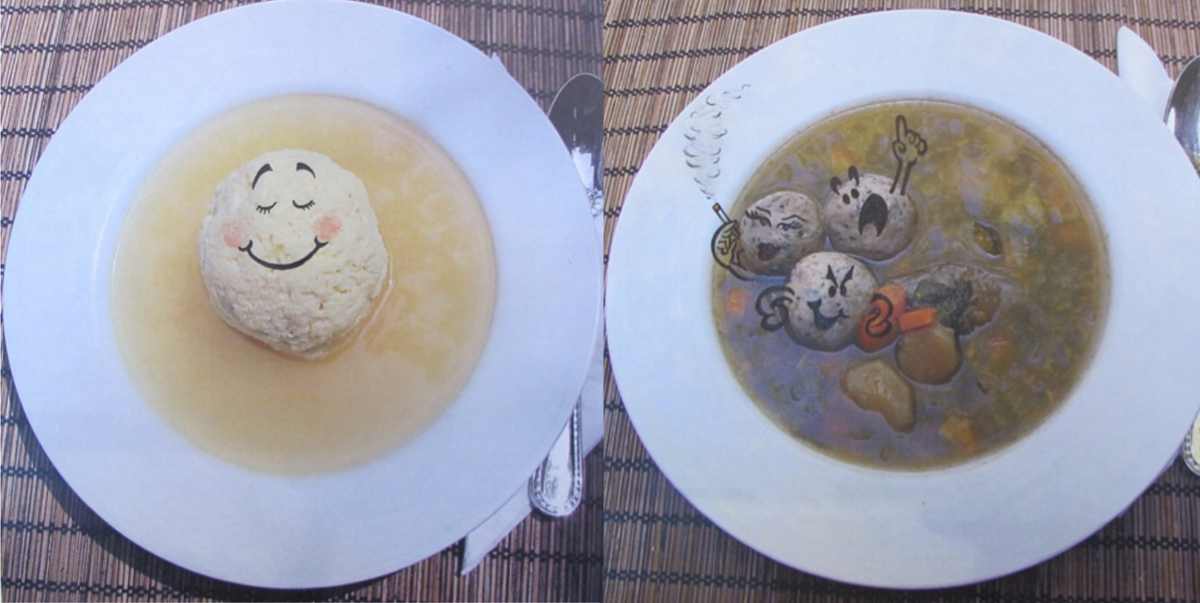My Matzo Ball Revelation
What an iconic food reveals about the difference between American Jews and Israelis




I remember the first time I ate an American matzo ball. It was a few months after I moved to the U.S., and I was sick. Like all good Jewish girls, I was well-versed in the qualities of the legendary “Jewish penicillin,” so I went to my local deli and ordered myself some chicken soup.
The woman at the counter handed me a bowl of clear, yellowish liquid in which was floating one huge, tennis ball sized, fluffy, white…thing. “What is that?” I asked. “Matzo ball soup,” replied the old lady.
Hmm. That thing did not look anything like the matzo balls I knew from growing up in Israel. The ones we ate there were small, hard and very flavorful. These American matzo balls were…none of those things.
As the years went on, I stopped buying that disgraceful wannabe soup and worked instead on perfecting my mother’s recipe—to the delight of many satisfied friends over numerous holidays and Shabbat dinners.
This past Friday, at our Seder dinner, our meal started as per usual—with my chicken soup and matzo balls. One of my guests, a new friend, looked down at her bowl in puzzlement.
“Are these…matzo balls?” she asked. She had the same reaction I had when I saw the American Ball for the first time. “Yes” I replied. “This is how we make them in Israel: hard, chewy, and full of spices and flavors.”
My friend, who had coincidentally just returned from visiting Israel for the first time, started laughing. “Ha!” she said. “These matzo balls are just like Israelis!”
I put my spoon down and looked at her. Good God, I thought, she’s right. The difference between an American Matzo Ball and an Israeli Matzo Ball is startlingly similar to the difference between Americans and Israelis.
On the one side, we have a hugely impressive, well-organized, perfectly round, soft and easy to eat, somewhat bland-flavored very large object. On the other side we have a group of small, hard, darker in color, spicy (or at least flavor-full) marble to golf ball-sized objects…
Israelis are an interesting breed. We’re a small nation, surrounded by 21 countries, whose governments for the most part would prefer we take residence elsewhere. We don’t believe in mincing words. There is no word in Hebrew for “Could I?” or “Should I?” Hebrew, when directly translated to English, can, through no fault of its own, come across as straight-up rude.
It is not rude at all. It IS straight-up. To us Israelis, being polite and not telling the truth as it is, whether with your family, friends or in a business setting, is not cool at all. In fact, practicing the beloved American PC talk in Israel is considered being fake. The idea behind it is that if you are my friend, you will be honest with me. You won’t be “nice” to me, you’ll tell me the truth. We call it “talking tachles”—be straight and tell it as it is. When you grow up in our neighborhood, there is no time to waste. It’s not easy for most tourists or foreigners doing business with Israelis at first, but once you understand the mentality it is much easier to maneuver as it is after all, real. No one will ever tell you something is “great” unless they actually think it’s great. And if they think it sucks, you’ll know about that too.For better or worse, we are a small and opinionated little nation.
Having said that, food, like nations, can be acquired tastes. And there is no one right way to act, one type of behavior that is better than the other. As a new American, I’ve also learned to appreciate our polite ways. It is much nicer to walk into an elevator and have a woman you’ve never met smile at you and say good morning. It is also easier to have real intimacy with your friends when you know you can tell them the truth if something bothers you. Both cultures work, and if you understand the differences between them you can benefit from both.
As for the matzo Ball soup, I do still prefer mine the punchy, Israeli way—and, after helping herself to two additional servings, my new guest said she liked them better too.
Or maybe she was just being polite.

(Pictures, art, and soup on the right: Noa Tishby).
Noa Tishby is an Israeli American actress, producer, writer and activist. You can follow her on Instagram, Twitter, and Facebook at @noatishby.